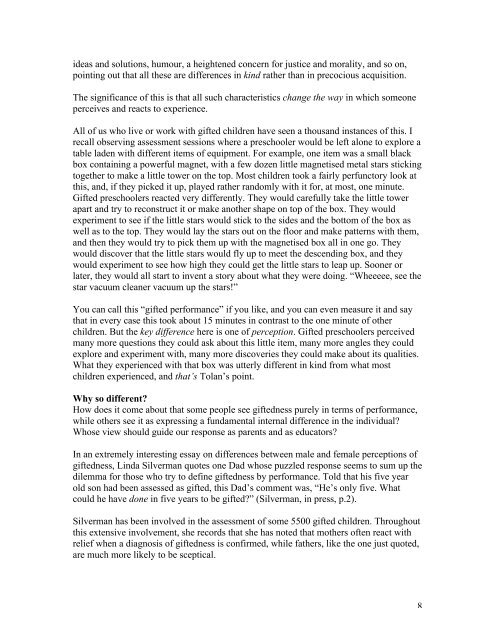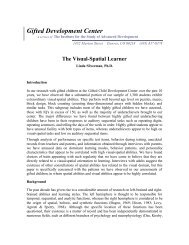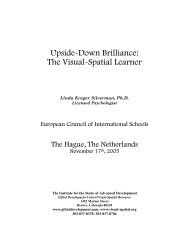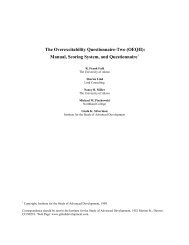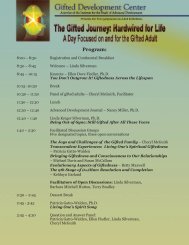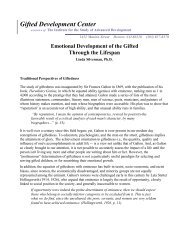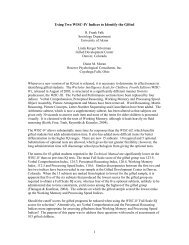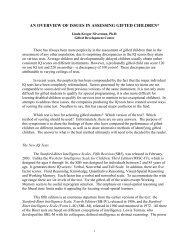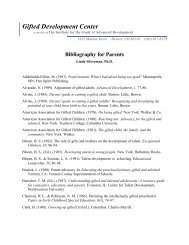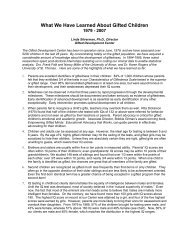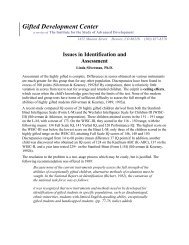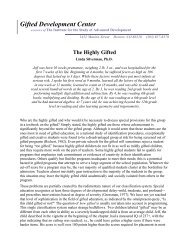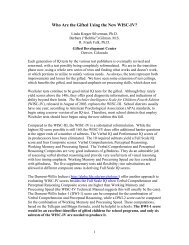THE CONUNDRUMS OF SUCCESS - the Gifted Development Center
THE CONUNDRUMS OF SUCCESS - the Gifted Development Center
THE CONUNDRUMS OF SUCCESS - the Gifted Development Center
You also want an ePaper? Increase the reach of your titles
YUMPU automatically turns print PDFs into web optimized ePapers that Google loves.
ideas and solutions, humour, a heightened concern for justice and morality, and so on,pointing out that all <strong>the</strong>se are differences in kind ra<strong>the</strong>r than in precocious acquisition.The significance of this is that all such characteristics change <strong>the</strong> way in which someoneperceives and reacts to experience.All of us who live or work with gifted children have seen a thousand instances of this. Irecall observing assessment sessions where a preschooler would be left alone to explore atable laden with different items of equipment. For example, one item was a small blackbox containing a powerful magnet, with a few dozen little magnetised metal stars stickingtoge<strong>the</strong>r to make a little tower on <strong>the</strong> top. Most children took a fairly perfunctory look atthis, and, if <strong>the</strong>y picked it up, played ra<strong>the</strong>r randomly with it for, at most, one minute.<strong>Gifted</strong> preschoolers reacted very differently. They would carefully take <strong>the</strong> little towerapart and try to reconstruct it or make ano<strong>the</strong>r shape on top of <strong>the</strong> box. They wouldexperiment to see if <strong>the</strong> little stars would stick to <strong>the</strong> sides and <strong>the</strong> bottom of <strong>the</strong> box aswell as to <strong>the</strong> top. They would lay <strong>the</strong> stars out on <strong>the</strong> floor and make patterns with <strong>the</strong>m,and <strong>the</strong>n <strong>the</strong>y would try to pick <strong>the</strong>m up with <strong>the</strong> magnetised box all in one go. Theywould discover that <strong>the</strong> little stars would fly up to meet <strong>the</strong> descending box, and <strong>the</strong>ywould experiment to see how high <strong>the</strong>y could get <strong>the</strong> little stars to leap up. Sooner orlater, <strong>the</strong>y would all start to invent a story about what <strong>the</strong>y were doing. “Wheeeee, see <strong>the</strong>star vacuum cleaner vacuum up <strong>the</strong> stars!”You can call this “gifted performance” if you like, and you can even measure it and saythat in every case this took about 15 minutes in contrast to <strong>the</strong> one minute of o<strong>the</strong>rchildren. But <strong>the</strong> key difference here is one of perception. <strong>Gifted</strong> preschoolers perceivedmany more questions <strong>the</strong>y could ask about this little item, many more angles <strong>the</strong>y couldexplore and experiment with, many more discoveries <strong>the</strong>y could make about its qualities.What <strong>the</strong>y experienced with that box was utterly different in kind from what mostchildren experienced, and that’s Tolan’s point.Why so different?How does it come about that some people see giftedness purely in terms of performance,while o<strong>the</strong>rs see it as expressing a fundamental internal difference in <strong>the</strong> individual?Whose view should guide our response as parents and as educators?In an extremely interesting essay on differences between male and female perceptions ofgiftedness, Linda Silverman quotes one Dad whose puzzled response seems to sum up <strong>the</strong>dilemma for those who try to define giftedness by performance. Told that his five yearold son had been assessed as gifted, this Dad’s comment was, “He’s only five. Whatcould he have done in five years to be gifted?” (Silverman, in press, p.2).Silverman has been involved in <strong>the</strong> assessment of some 5500 gifted children. Throughoutthis extensive involvement, she records that she has noted that mo<strong>the</strong>rs often react withrelief when a diagnosis of giftedness is confirmed, while fa<strong>the</strong>rs, like <strong>the</strong> one just quoted,are much more likely to be sceptical.8


